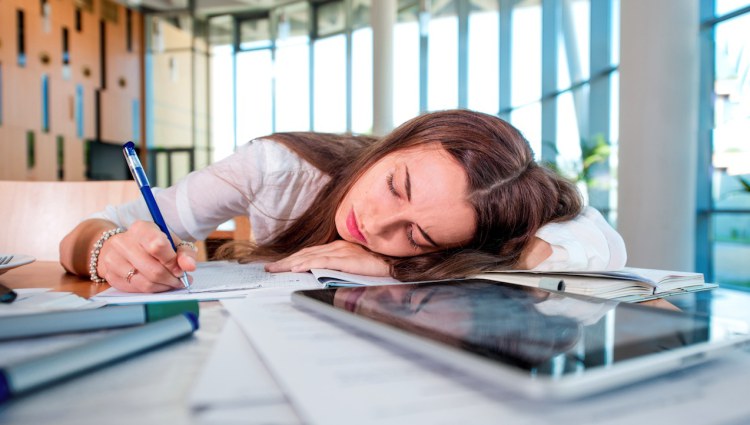By Janaki Patel: independent research student (junior)
The average person can survive more than three weeks without food, but only around ten
days without sleep. In the modern world, high schoolers tend to participate in many oppressive
activities, which do not allow for a full night’s sleep. This in turn disrupts their circadian sleep
cycle, which is a series of mental, physical, and behavioral changes that follow a daily pattern.
Although they are just beginning their journey into adulthood, adolescents are increasingly
exposed to many competitive environments, including the stress of school, allowing them to
experience the effects of sleep deprivation too early in their life.
Sleep deprivation can often lead to more serious problems such as fatigue. The symptoms
of fatigue and sleepiness are so similar that many are unable to differentiate the between the two.
Sleepiness can only be solved by sleeping, while fatigue does not automatically lead to the need
for sleep. Fatigue consists of exhaustion from exposure to a demanding task for a considerable
amount of time, and can be rectified by stopping the task and doing something more relaxing.
The symptoms reflect an imbalance between the demands of education, sports, extracurriculars,
the rapid change in growth and development of these adolescents and the healthy sleep
requirements that these teenagers need. Accordingly, they need more sleep than adults, yet these
demands often cause them to sleep less.
Sleep deprivation in adolescents leads to decreased motivation causing a decline in grades, poor mental and physical health, impaired motor control, and delayed reaction time. Sleep deprivation can also have an effect on executive functioning, which are a set of skills that help get things done. Executive function is controlled by a structure of the brain called the frontal lobe. The frontal lobe regulates activities such as managing time and concentration. A reduction in regulation due to sleep deprivation can reduce the effectiveness of the frontal lobe. For example, sleep deprived people have difficulties thinking of imaginative words or ideas, instead choosing repetitious words and phrases.
Sleep deprivation causes the capacity to process information to be reduced, and therefore it is not optimal. When learning information during the day at a less than optimal state, the brain will not retain it while sleeping.
Another serious impact that sleep deprivation can have it drowsy driving. Many may not
realize the drastic effect that drowsy driving can have. It can lead to car accidents and possibly
death. It is not possible to control the body when sleep overcomes it, and this can have drastic
consequences, especially when it comes to driving. According to a National Sleep Foundation
poll, “60% of adult drivers (about 168 million people) say they have driven a vehicle while
feeling drowsy in the past year. Additionally, more than one-third of Americans (about 103
million people), have actually fallen asleep at the wheel”. Drowsy drivers include people who
have had long work shifts, or have been driving for a long time. The National Highway Traffic
Safety Administration predicts that drowsy drivers caused 72,000 crashes, 44,000 injuries, and
800 deaths in 2013.
To gauge the toll of lack of sleep on high school students, a recent survey was sent out to
the high school student population of River Hill High School in Howard County, Maryland. This
form of data collection included voluntary participation regarding the effect of students’
cognitive abilities after the effects of lack of sleep. Out of 109 students, 73.4% have fallen asleep
in class, and 82.6% recall usually feeling tired in school. Only 5.5% get the healthy 8+ hours of
sleep per night, and 97.2% wish they could get more sleep. In a typical day, 58.7% of participants do homework between school and dinnertime, and 24.8% participate in sports. The
survey results and research show a strong correlation between the hours of sleep one receives
and his or her energy, mental illness, and overall health.
In order to avoid these harmful effects, make sure to take breaks while performing
rigorous and mentally or physically draining activities. Rest is important, so make sure to get the
most hours of sleep possible. A factor affecting this is technology use, which can deter the brain
from slowing down and being able to fall asleep. The light from technology excites the neurons,
and causes the brain to fight against the mechanism of sleep. The “blue light” from electronic
devices trick the brain into thinking that it is daytime, slowing down melatonin production which
the body needs to feel sleepy. Naps are also an essential part of giving the body and brain a break
and to restore energy. Fifteen minute naps can help by providing more energy to perform work,
but a thirty or more minute nap is not the best solution because it will be harder to fall asleep at
night, when the body is wired to rest. It is also important to create a schedule that allows you to
take care of yourself. Take classes that are challenging, but not overwhelming. Make sure to
prioritize your health before anything else.

